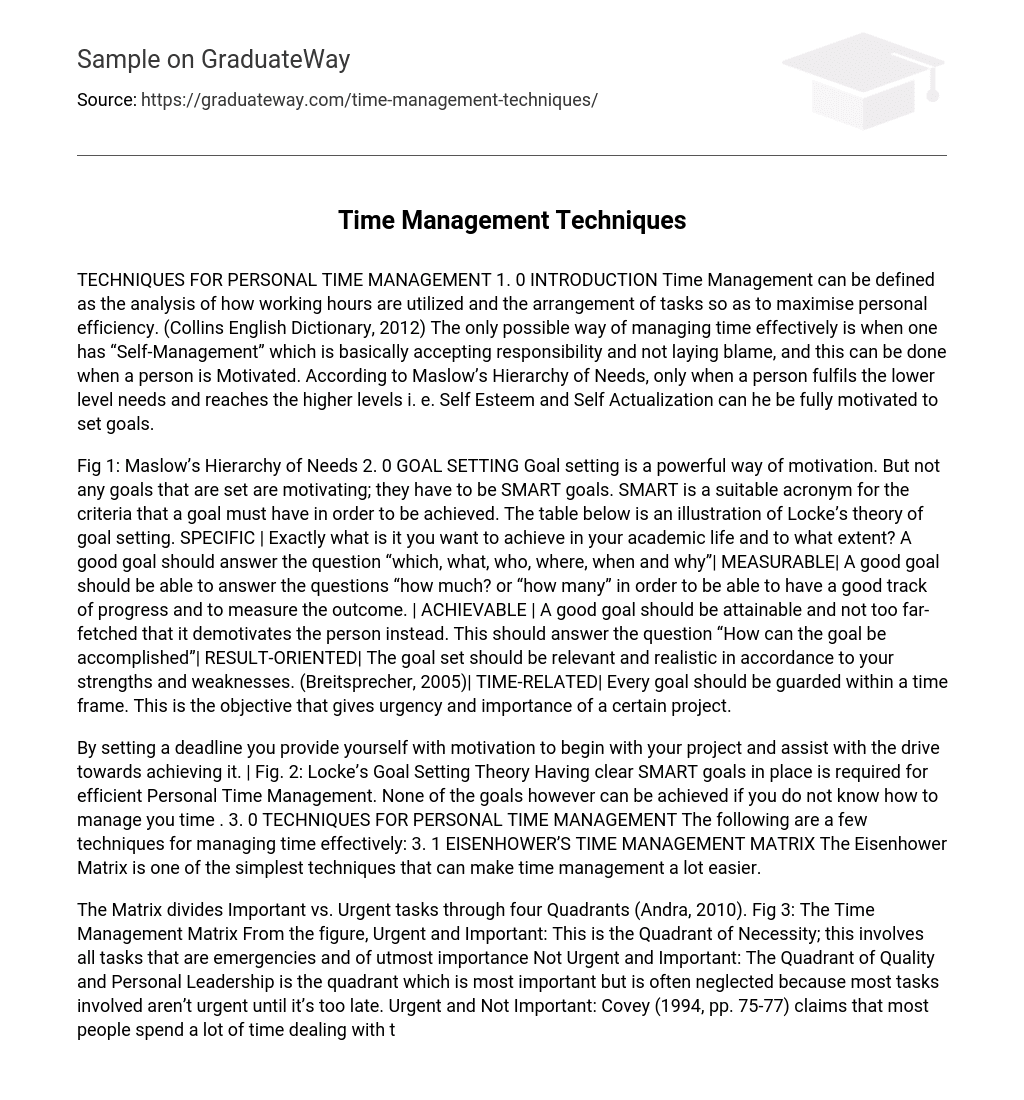Time Management can be defined as the analysis of how working hours are utilized and the arrangement of tasks so as to maximise personal efficiency. (Collins English Dictionary, 2012) The only possible way of managing time effectively is when one has “Self-Management” which is basically accepting responsibility and not laying blame, and this can be done when a person is Motivated. According to Maslow’s Hierarchy of Needs, only when a person fulfils the lower level needs and reaches the higher levels i. e. Self Esteem and Self Actualization can he be fully motivated to set goals.
Facebook, watching too many TV shows, excessive sleeping etc. I completely ignored QII because it wasn’t urgent. By adapting to the Time-Management Matrix, I am now able to manage time more efficiently. Before beginning any task I firstly evaluate which quadrant it falls under, I then know if I should focus on the task or avoid it. Also by focusing on tasks under QII, I am able to prevent many tasks from falling into QI i. e. by eating well and exercising, I avoid getting sick or by preparing for assignments and exams beforehand I avoid deadline pressure.
The second technique, Pareto’s Principle has made it clear that the amount of time spent studying doesn’t matter as much as “HOW” the time is spent studying. To ensure good grades, I need to stop spending all my time studying but instead re-allocating time to responsibilities that will accomplish this. A good example would be to attend all the lectures and understand each topic and concept fully. By understanding and analysing the lectures I will gain the 80% while memorisation and revision will be the remaining 20%. The third technique involves the 3Ps.
By creating a daily to-do list I will be able to decide which tasks are of more Priority than the others. After prioritising I am able to Plan when to begin on a particular task, smart planning often aids in saving time. Setting remainders on my phone will help ensure I begin the task on schedule. Performance hence follows; if I follow the schedule within the timeframe I have a better chance for continuous productivity. The POSEC method is a method that would help me focus my attention on daily responsibilities, not only academic related but also pastime activities that will help me climb higher in the Maslow Pyramid.
To begin with, Prioritise by setting tasks in order of importance. By Organising I’d be able to know when to begin on a task more efficiently without chaos. As the word suggests, Stream-lining my tasks would enable me to tackle situations which require more time and effort easier. Just like how money needs to be economised so does time, this can be done when priorities are set on important tasks rather than just enjoyable ones. Last but not least contributing, in-order to fulfil Maslow’s Hierarchy of Needs contribution and social obligations should be fulfilled.
Chunk, Block and Tackle method can be summarized as breaking down of main goals into smaller sub-goals and tasks. I would mainly apply this method when dealing with larger projects or assignments, by breaking down the project into smaller Chunks. Then assign each smaller task (Block) within a certain timeframe and lastly tackle it. This makes it simpler than tackling a project as a whole.
To sum up on time management techniques the only way a student can be able to manage time effectively is to avoid procrastination completely and be able to be say no when distractions arise, in other words be assertive. This will enable success in academic as well as social life.
REFERENCES
- ALLEN, D. , 2009, ‘David Allen on Getting Things Done, Tips on Using Your Time Productively’ Success, What Achievers Read, vol. 08, issue no. 973, (viewed on 24th November 2012) http://www. success. com/articles/973-1-on-1-david-allen-on-getting-things-done
- ANDRA, M. , 2010, What is the Eisenhower Matrix, Codehoop Labs, viewed 28th November 2012 http://timegt. com/2010/07/14/what-is-the-eisenhower-matrix/
- BREITSPRECHER, W. P. , 2005, Goal Setting, BreitLinks, Viewed 30th November 2012, http://breitlinks. om/community/goal_setting. htm
- CARROLL, S. , 2010, The 3P’s of Time Management Success (online) New York, NY, viewed 30th November 2012 http://www. seancarrollspeaker. com/2010/11/the-3-ps-of-time-management-success .html





